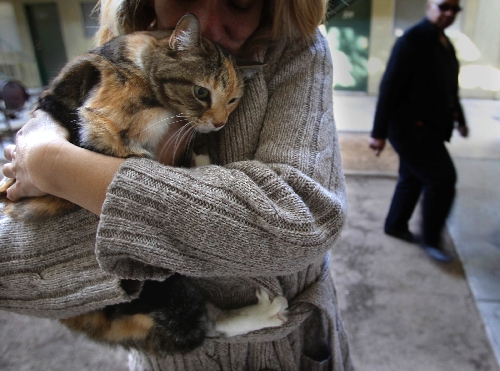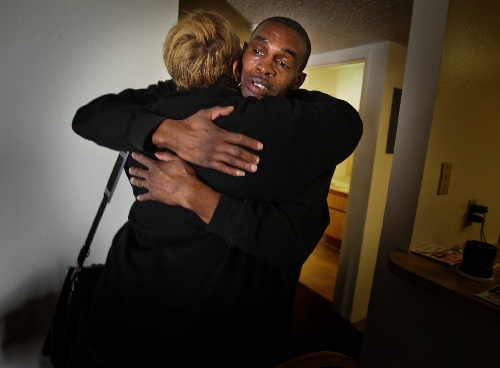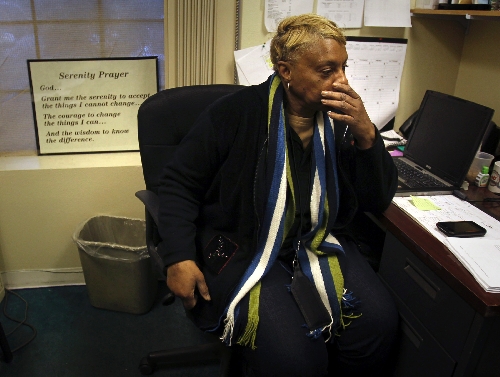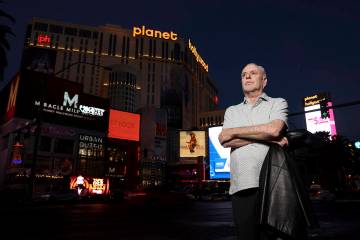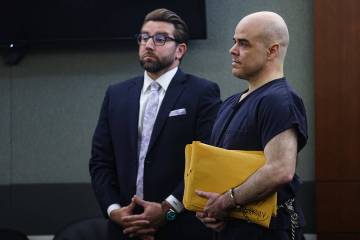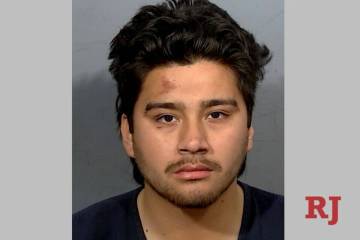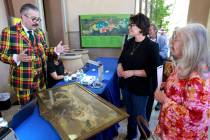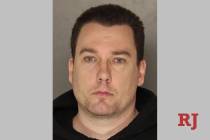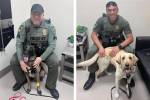HELP of Southern Nevada gives hope to addicts, homeless
Calixto Garzota won't let go.
He's got Crystal Williams in a bear hug and is rocking her back and forth in the frigid mountain air. They are laughing and crying together.
"Oh, I missed you so much," he says, squeezing her. "Miss Crystal, my favorite case manager."
It's been just more than a week since Garzota saw her, but it's been a really long week. He went through detox and moved into WestCare's Harris Springs Ranch, a residential substance abuse treatment facility for men and boys near Mount Charleston.
He keeps apologizing for not being able to stay clean on his own since she pulled him out of a Las Vegas homeless encampment a few months ago.
"I feel like I disappointed you," Garzota says tearfully.
This is a little intense for 9 a.m. but doesn't faze Williams, who has pretty much seen it all. The 59-year-old has worked in human services for 35 years, the last three as a case manager of chronically homeless people for HELP of Southern Nevada. Most of the 25 people on her caseload are dealing with long-standing addictions and mental health problems.
She is used to meeting people at rock bottom. There is no average day.
"I never start the day saying, 'It's going to be a great day,' " she says. "I say, 'It's going to be an exciting day.' "
Today Williams will travel to every corner of the Las Vegas Valley to visit the homes of 10 of her clients, each at a different level of independence. They all will be glad to see her. She'll take two of them grocery shopping and stop at the pharmacy to pick up a prescription for a third. Lunch will be a quick hot dog from a corner convenience store. At one point she'll either rescue or kidnap a cat, depending on your point of view. And her cellphone will ring almost nonstop -- clients calling to check in, ask a favor, hear a few words of encouragement.
Each case is complex in its own way. Everyone needs something different: detox, bus passes, tough love, Prozac, toilet paper, a hug. What they share in common is the need.
MAMA BEAR
Williams visits three clients at the wooded Harris Springs Ranch, including Garzota, 42. They've been calling frequently, needing her.
"They're just lonely little birds," she says.
One of them is Jason McKenzie, 33, who was homeless for about a year before joining HELP's program nine months ago. He, too, had trouble staying sober, even with outpatient treatment. Now he's got a month's worth of sobriety under his belt.
"I'm glad I'm here," he says, hugging Williams.
She laughs at his change of heart. "You almost beat me up because you didn't want to come here."
Williams "was doing everything possible to get me to sober up," McKenzie says. "To her, I'm a person, not just another file. When you start messing up, she turns into Mama Bear. But she doesn't tear you down. She builds you up."
Williams acknowledges becoming "the mother, the auntie, the veterinarian, the gardener. I'm everything to them, because they've had no one. They're just part of my family."
Her work day rarely ends: "It's 24/7."
Williams doesn't mind. Her passion stems in part from personal experience. She knows that change is possible, however difficult.
The divorced mother of one adult son grew up in a comfortable, middle-class home in Los Angeles, "but my parents were alcoholics."
Williams struggled for years with her own substance abuse issues. She moved to Las Vegas two decades ago looking for a change. Finally, in 2003, she completed a 90-day inpatient treatment program and has been sober since.
"I know that treatment works, if you are willing," she says. "You work so much harder because you know they can succeed. You have to have all that passion burning in your soul."
Williams rarely talks to her clients about her own background.
"The focus is on them, not me," she says.
When she finishes catching up with the guys at Harris Springs, she hugs each of them again.
"Thank you for not giving up on me," Garzota says.
McKenzie says, "All right, Mama Bear."
BAD COP
Williams is known for her friendly approach, but says she can be the bad cop when necessary.
"You want to show people you care, that you aren't phony," she says. "But you can't let them step on that and abuse it."
She is used to being the target of her clients' erupting emotions. She's been cursed, threatened, even spat upon.
One client said he was going to kill her.
"I said, 'Come on with it,' " Williams says. " 'Let's put on the boxing gloves.' "
A time or two, she has encountered clients so aggressive she wonders if she can help them.
"I had to slap myself and say, 'You fool, of course you can.' "
When situations get tense, she reminds herself that many of her clients are very ill and need compassion.
"I just need to get them into treatment."
Losing her temper is not an option.
"If I ever got to that point, I'd go to my office, lock the door and drop to my knees," she says. "I'll walk away and say a prayer."
Some clients eventually succeed, become independent and leave the program. Sometimes it takes years. Others fail, though Williams doesn't see it that way.
"On average I feel we have made a difference in one way or another," she says.
DAVID
Midway through the day, Williams drops in on David Matthews, 51, who lives in a tidy apartment in south Las Vegas.
Matthews is a former airport screener who got hooked on opiates after injuring his back years ago. He spent three years living in a Henderson homeless encampment before outreach workers from HELP of Southern Nevada came along.
"I was scared at first," he says. "Crystal said, 'Yeah, you can do it.' Now, here I am. It's a blessing. A godsend."
Matthews keeps keychains and coins that mark milestones in sobriety -- he has been clean eight months -- on a table in his living room.
"I want to be reminded of where I've been."
The tall, lanky man now finds other ways to deal with his chronic back pain, including using a heating pad. Williams looks at it.
"Maybe I can get someone to donate a better heating pad," she says.
"These guys, they never say no," Matthews says, his arm around Williams' shoulders. "It's rare someone would stop to take you out of the desert, get you started, get you clean. They've been there for me the whole time."
Months ago Williams gave Matthews a houseplant, thinking it might help him to nurture something.
"You're going to bring it back to life," she told him.
"I thought it was going to die," he says.
Instead the plant has grown and now thrives next to a window.
"I think she was testing me with a plant," he says. "Next she'll get me a girlfriend."
THE CAT
In the afternoon Williams drops in on a female client who asks not to be identified.
The 48-year-old former cocktail waitress is trim, her blond-gray hair thick and stylish.
She has been a HELP client nearly two years.
"They saved my life," she says.
Williams "helped me get my soul back. She took it upon herself to take care of me. I'll never forget her."
Williams responds with a cheeky: "Oh, I'll never forget you, either."
It's about this time Williams and Ed Vega, a HELP treatment coordinator who often teams up with Williams, decide to rescue a cat.
The upstairs neighbor, also a HELP client, apparently has disappeared, leaving his cat alone in the apartment. No one has seen the man in days.
The former cocktail waitress agrees to take in the cat.
The three of them climb the stairs and enter the man's apartment. (HELP keeps extra keys in case they need to check on the welfare of clients.)
They spend a few minutes crawling around, calling, "Here, kitty." Finally, they find the calico hiding under the bed. The former cocktail waitress takes it home.
An hour later, Williams and Vega are fielding calls from the furious cat owner, who is now home and wants his cat back. The former cocktail waitress is calling, too. She doesn't know what to do.
"Just give him his cat back," Vega tells her. "He is rather upset."
Later, Williams will visit the cat owner to apologize about the misunderstanding.
Laughing, she says, "We will obviously investigate more thoroughly in the future before removing any animals."
A DAY'S WORK
Williams spends the rest of the afternoon visiting other clients around town, most of whom are at home when they are not at doctors' appointments or attending counseling, substance abuse treatment and vocational rehabilitation.
HELP caseworkers encourage clients to wait until they have achieved a long stretch of sobriety before looking for a job.
It's a bad idea to give newly sober people access to a lot of cash, Williams says.
She brings her newest client, Fred Beutler, a shower curtain for his apartment.
Beutler, 40, is a former iron worker who has been in HELP's program just three weeks. He spent two of them in the hospital because of health problems caused by chronic alcoholism. His liver is now so damaged that drinking a single beer sends him to the hospital, he says.
"The doctor said, 'If you want to die, you might as well do it right,' " he says. "I finally listened. I don't want to go back."
Williams tells him he is looking better. Then she and Vega take him grocery shopping .
It's not until later, when Williams arrives back at her small HELP office, on Flamingo Road just west of Maryland Parkway, that she takes a moment to breathe.
"There's no time for exhaustion until things are done," she says.
It's about 4 p.m. Her day started at 7:30 a.m. She'll spend the next hour or so doing paperwork, then head home.
Tomorrow is another day.
Contact reporter Lynnette Curtis at lcurtis@reviewjournal.com.
MORE INFO
Contact HELP of Southern Nevada at their website, helpsonv.org or call 702-369-4357.




